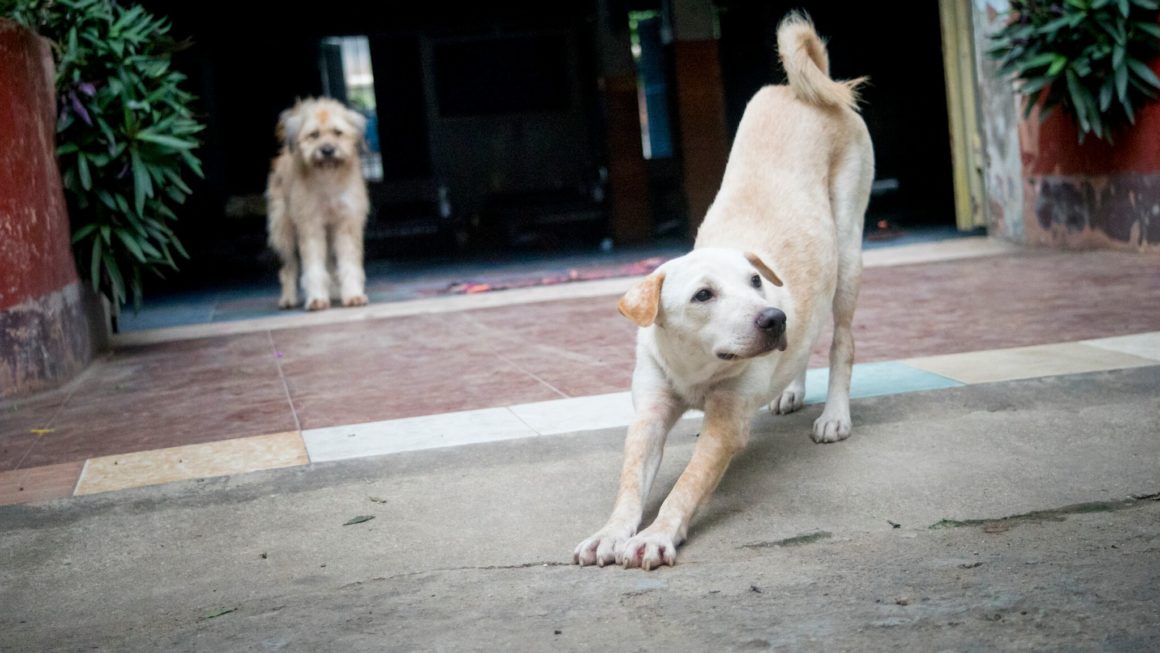ចុចត្រង់នេះដើម្បីអានអត្ថបទជាភាសាខ្មែរ។.
What is Rabies?
According to the World Health Organization (WHO), rabies is a disease caused by a virus that is transmitted from animals to humans. Usually carried by dogs, the virus is transmitted through the saliva which enters the body in contact with a wound or a mucous surface (in the case of a bite).
There are two manifestations of rabies:
- Furious, which is the most common and makes the dog hyperactive and aggressive
- Paralytic, which makes them sleepy
What Types of Exposure are there?
There are four different types of exposure with an animal that has rabies:
- Touching and licking intact skin (free of any wound)
- Nibbling, minor scratches/abrasions, licking on broken skin
- Transdermal bites/scratches, saliva in contact with mucous surface, scratches or bites from a bat
- Exposure/contact with infected body parts
They need a different approach to the treatment.
How to Get Treated?
It is highly recommended to immediately wash and flush the skin that was exposed.
No. 1: A simple touch/lick does not require any further treatment. In case you suspect that the animal that touched/licked you has rabies, you should still see a doctor.
No. 2, 3, and 4: Immediate vaccination is required for the two other cases as well as an administration of rabies immune globulin in the case of a bite or contact with a mucous surface. The post-exposure treatment is usually prescribed as 4 to 5 intramuscular doses over four weeks.
If you have completed a pre-exposure vaccination or a post-exposure treatment, 2 doses separated by three days are sufficient and the immune globulin treatment is not necessary.
Keep in mind that there is a vaccination against rabies. The WHO recommends this vaccination as prophylaxis for veterinarians, animal handlers, and people living in areas with lots of street animals.
Do You Think a Dog May Have Rabies? Do this:
If you think a dog may have rabies, stay away from the dog and do not approach! Call the IBCM hotline number and a knowledgeable staff member will advise you on how to proceed.
+855 (0)10 804 176 (English, Khmer)
Signs of rabies include: salivating heavily, biting everything, and acting strangely.
What to do after a Dog Bite?
If you were bitten by an animal or have been in contact with an animal (scratch, lick, etc.) that you suspect may have rabies, visit a knowledgeable doctor or clinic immediately! Even if you had the pre-exposure rabies vaccinations. In Phnom Penh, InstitutePasteur is experienced with rabies: Location Monivong Blvd./Street 84, Phone +855 12 812 003.
If you get bitten by a dog that does not display any rabies symptoms, contact the ARC-IBCM team to inquire whether an immediate vaccination is necessary: +855 (0)81 80 41 76 (English, Khmer)
What is the situation in Cambodia?
We were lucky to have an interview with Dr. Sowath Ly and his colleague Veasna Duong, from the Pasteur Institute in Cambodia. They explained the main challenges of rabies in Cambodia.
Rabies is a big problem in Cambodia, which causes approximately 800 deaths per year. According to studies from the Pasteur Institute of Phnom Penh, 50% of biting dogs are infected by the virus. Whereas dogs are the main carriers of the virus, some cases of cats and bats have been reported as well.
Therefore, the main challenge is to keep the dog population vaccinated and under control, which is difficult since it is not common to neuter stray dogs or assure their well-being. Read up on all the benefits of spaying and neutering here.
Only a very small percentage of dogs are actually vaccinated: Cambodian dog owners, that heard about the necessity of vaccinations, and foreigners living in Cambodia.
A rabies vaccination costs around 10-15 USD per animal, which is often considered too high of an expense for a Cambodian family. Furthermore, locals are often not aware of the immediate danger their pets and families are in. It is thus extremely important to educate the general public about rabies and introduce them to the necessity of routine vaccinations.
In Phnom Penh, there are only a few places that deliver the vaccination for humans: The Pasteur Institute in Phnom Penh & the National Institute for Public Health as well as some private clinics.
Rabies in Cambodian Dogs
According to a study in Battamang, conducted by the Pasteur Institute in Phnom Penh, street dogs on average only reach an age of 18 months. Sometimes they are sick or get hit by a car, but many times, they are sold to the brutal dog meat trade.
This is cruel for the dogs, and dangerous for the people catching the dogs, as rabies can be transmitted by exposure/contact with infected body parts from a dog who carries the rabies virus.
Any rabies vaccination efforts for street dogs must reach at least 70% of these street animals to achieve a so-called “herd immunity”.
More information on ending the dog meat trade. In fact, global animal charities say that ending the brutal dog and cat meat trade is crucial to ending rabies around the world by 2030.
ARC is helping as well!
We are doing our part! In 2019, Animal Rescue Cambodia with our partner Mission Rabies vaccinated 7,400 animals in Phnom Penh against rabies.
The Way Forward to Rabies-Free Cambodia
A plan by ASEAN, that aims to eliminate rabies before 2030 is also in place. Research is conducted at the Pasteur Institute in Paris to reduce the number of injections of the vaccine.
Four injections within a month are currently needed but the goal is to reduce this to three injections in a week. It is important for veterinary clinics, animal welfare organizations, and the government to closely work together to effectively eradicate rabies.

